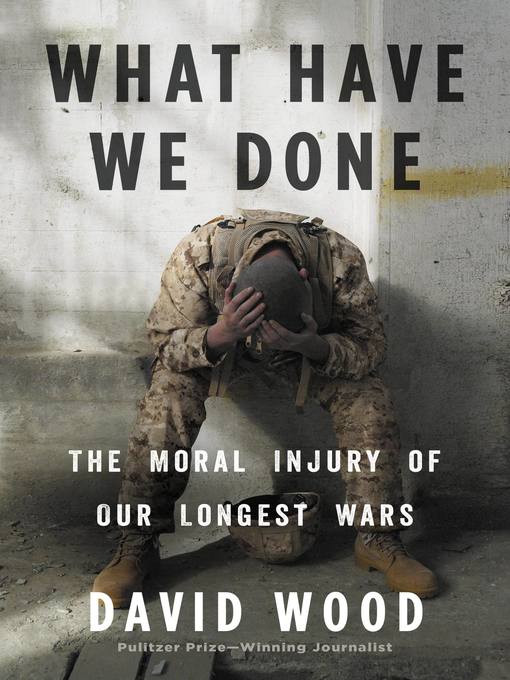
What Have We Done
The Moral Injury of Our Longest Wars
کتاب های مرتبط
- اطلاعات
- نقد و بررسی
- دیدگاه کاربران
نقد و بررسی

Starred review from September 12, 2016
Wood, a longtime war correspondent, takes on the monumental task of conveying to civilians the emotional turmoil veterans endure upon returning home from war. Post-traumatic stress disorder tends to dominate headlines, but Wood focuses upon “moral injury”: the deep-rooted psychic trauma that grips people when they believe they have violated the profound taboo of killing another human. Though the book touches on other conflicts, including soldiers’ responses to discovering concentration camp survivors during WWII, this is primarily a powerful and gut-wrenching look at the 21st-century Americans who have faced multiple deployments in Afghanistan. Even as drill sergeants train soldiers in the dark arts of killing and surviving encounters with the enemy, the American military barely acknowledges the long-term repercussions. Wood probes how soldiers learn to cope with—or fail to recover from—these debilitating experiences and reveals how a few stalwart medical professionals help them deal with the types of profound pain that leave no visible scars. He also covers the work of chaplains tending to spiritually wounded veterans and grapples with the experiences of soldiers who have been sexually assaulted by comrades-in-arms. Wood delivers searing, elegantly told reportage on a little-understood and long-ignored facet of war. Agent: Gail Ross, Ross Yoon Agency.

October 15, 2016
A wide-ranging study of the moral costs of the wars in Afghanistan and Iraq, costs that are certain to carry over into future conflicts--to say nothing of civilian life."The army trained you to fight. It did not train you for psychological shock." So said a military veteran to Pulitzer Prize-winning Huffington Post correspondent Wood. The author examines a range of related problems, both abstract and concrete, wrought by wars waged against largely unseen, unknowable enemies--with the result that, too often, the foe becomes a preteen with a Kalashnikov. An overarching malady is "moral rot," which one West Point military ethicist holds to be the logical result of cynicism and corruption at the top, manifested infamously by the Abu Ghraib prison case, less openly by such things as escalating rates of military suicide, mental illness, divorce, and other woes. While field soldiers were "struggling to apply their moral codes to the chaos of combat," writes Wood, "those above them were blatantly violating the military's own moral code of values, both to accomplish their mission and for their own career advancement." Whether career soldiers or single-hitch enlistees, many warriors returning from the fight are afflicted by what is informally called "war trauma," a cousin of but unlike the better-known PTSD--though it shares with PTSD the resistance of those in the hierarchy to admit such a thing exists in the first place. As Wood notes, Jonathan Shay, a clinical psychiatrist, prefers to call this category of illness "moral injury" rather than disorder, because it places the onus on the afflicted rather than on the agency of being called on to behave unjustly in war and must bear the burden. Killing, even justifiable, exacts a toll on the perpetrator as well as the victim; as one soldier told the author, meaningfully, "you know, I'm not a psychopath." The psychological and moral aspects of war and trauma are not well-understood, and Wood's book is a welcome contribution to the field. A good complement to David Finkel's Thank You for Your Service (2013).
COPYRIGHT(2016) Kirkus Reviews, ALL RIGHTS RESERVED.

June 1, 2016
Wood, a staff correspondent for the Huffington Post who won a 2012 Pulitzer Prize for his national reporting on severely wounded soldiers, goes beyond the physical and psychic injuries inflicted by war to address moral injury, that is, the painful violation of soldiers' entrenched sense of right and wrong that can result from facing the stark moral dilemmas of modern conflict. With a 35,000-copy first printing.
Copyright 2016 Library Journal, LLC Used with permission.

September 15, 2016
The "collateral damage" of civilian death has been a feature of armed conflict for millennia, especially during the conflicts in Iraq and Afghanistan. Pultizer Prize-winning journalist Wood, who has served several tours as a foreign reporter for Time magazine and other publications, applies his investigative skills to the question of how the men and women of U.S. armed services have dealt with the emotional trauma of war and the moral consequences of intentional and unintentional injury to noncombatants in a war zone. Wood interviews several military personnel who share their stories, including the heavy burden they carry as a result of their experiences in the chaotic midst of violence that so often characterizes warfare in the modern era. The author asks readers to go beyond the act of parades and polite applause and make an effort to listen to our servicemen and -women as they describe the emotional and mental anguish they carry as a result of upholding their duties. VERDICT This powerful book is essential reading for anyone seeking to understand the life of a soldier after they return home from war.--Ed Goedeken, Iowa State Univ. Lib., Ames
Copyright 2016 Library Journal, LLC Used with permission.

























دیدگاه کاربران